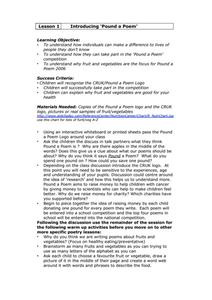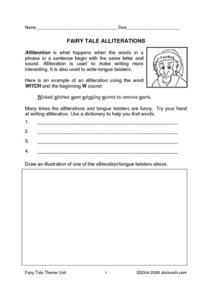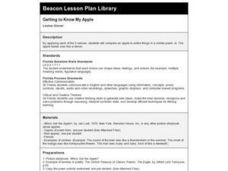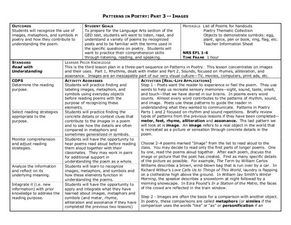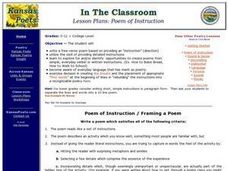Curated OER
"How to Eat a Poem"
Eighth graders write a poem showing what they know about metaphors, and non-literal language to express ideas, convey meaning, and create images after they read Eve Merriam's "How to Eat a Poem".
Curated OER
Pound A Poem
Students participate in various poem-related lessons to learn how they can make a difference in the lives of people they don't know. In this poetry instructional activity, students discover that this pound a poem competition is about...
Curated OER
Fall Similes and Metaphors
Young scholars interpret what a similies and metaphors are. They give examples of similies and metaphors. Pupils write different similies and metaphors using fall or autumn descriptive words. Students base their comparisons on facts,...
Curated OER
Reading, Writing, Reciting Exciting Poetry!
Students complete a poetry analysis unit. In this poetry analysis lesson, students study poetry by reading, reciting, and analyzing poems and their poets. Students study poetic devices, write their own poems, and complete hands-on...
Curated OER
Fish Swimming--A Poem by Moniza Alvi
In this poetry analysis activity, students read the poem "Fish Swimming," and discuss the metaphors in the poem. Students complete eight activities based on the poem, including rewriting the subject of the poem and watching two...
Curated OER
Fairy Tale Alliterations
Fairy tales are the perfect way to focus on alliteration. Learners complete activities relating to alliteration and similes using a fairy tale theme. Then, they complete an acrostic poem using the words fairy tale.
Curated OER
Poetic Devices
Introduce middle schoolers to poetic devices with a lesson that asks them to find examples of alliteration, anaphora, onomatopoeia, metaphors, similes, and personification in various poems. Young scholars craft examples of these poetic...
Pearson
Langston Hughes
An author study provides learners the opportunity to explore in depth the life of, the influences on, and the works of a single literary figure. Introduce middle schoolers to Langston Hughes with a unit that models how to approach an...
Texas Education Agency (TEA)
Simile and Metaphor (English III Reading)
The key idea in this interactive exercise designed for high schoolers is that figurative language, especially similes, and metaphors, add layers of meaning to a text. Users examine examples from speeches, ads, movie dialogue, and poems,...
Reed Novel Studies
Fever 1793: Novel Study
There is no escaping fever in 1793. Mattie, a main character, soon learns that a disease outbreak has taken over much more than her hometown. Scholars discover how Mattie responds to her circumstances by learning new vocabulary and...
Reed Novel Studies
The Lions of Little Rock: Novel Study
A true friend sticks with you through thick and thin. Marlee and Liz, main characters in The Lions of Little Rock, have that type of friendship. Scholars learn vocabulary and answer comprehension questions as they read how the two girls...
Reed Novel Studies
Where The Mountain Meets The Moon: Novel Study
Does good fortune lie within the man in the moon? Minli, a young girl in Where the Mountain Meets the Moon, sure hopes it does, so she sets out to find the Old Man of the Moon for answers. Along the way, Minli meets several magical...
Curated OER
Introducing Communication Talent with "Casey at the Bat"
Analyze the poem "Casey at the Bat." Your team of analysts will read the poem and complete a variety of activities, including describing how Casey looks and acts, describing how he feels before and after he strikes out, and sharing...
Curated OER
Getting to Know My Apple
First graders compare an apple to unlike things in a simile poem. ie: The apple tastes sour like a lemon. When poems are complete, have students share their simile poems with the class and finish eating their apples.
National Park Service
Petrified Forest National Park
Poetry Soup, a reading and writing unit constructed by the Petrified Forest National Park, will have scholars hungry to learn about nature. The cross-content unit contains topics related to history, science, and language arts. Content...
Curated OER
Patterns In Poetry: Images (Part 3)
Students explore imagery in poetry. For this poetry lesson, students examine how the use of metaphors and similes aid in reading comprehension. Multiple resources are provided.
Curated OER
Deciphering the Mechanics of Poetry
Eighth graders study poetic devices and use them in their own writing and apply them when reading poetry. In groups, they describe an item using poetic devices.
Curated OER
Fall Similes
Students create descriptive autumn similes and write them on fall-themed paper. They first write the autumn simile, and then arrange the plants around the border of the paper. They use natural plants which must be pressed.
Curated OER
Poem of Instruction
Students write a free-verse poem and utilize the skill of providing detailed instructions. identify opportunities to create poems from simple, everyday verbal or written instructions. They study everyday language that has merit as poetry.
Curated OER
Forms of Poetry
Pupils identify distinguishing features of poetry. They identify and use literary terminology including symbol, theme, simile, and alliteration. They recognize the effects of language.
Curated OER
Introduction to Poetry
Students determine the rhyme scheme of a poem and find examples of similes. In this poetry analysis lesson, students review definitions needed for the topic and analyze the rhyme or rhythm for the example poems. Students also find...
Curated OER
Beatrix Potter and Alliteration
In this creative writing worksheet, students utilize a variety of strategies to creatively write alliterations, tongue twisters, similes and finally an acrostic poem.
Curated OER
Solar System -- Writing Conventions
In this solar system instructional activity, students learn writing conventions such as alliteration, similes, and acrostic poems. All pertain to the topic of space and solar system.
Curated OER
Simile Stories
Fourth graders view song lyrics and identify similes in the song text. In this similes lesson, 4th graders define and identify similes on a worksheet. Students write their own similes using various adjectives.



